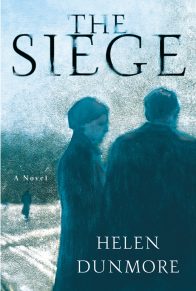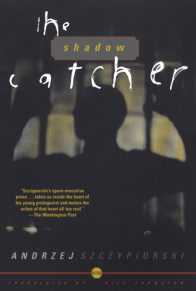Now he could hear a buzzing on the line. A warm, dirty rain ran down the glass. The air smelled of soot or of some nameless poison.
Tuesday, he thought. It makes no sense that it’s Tuesday. But nothing else makes sense either.
He could clearly hear the line buzzing in the receiver. A boy in jeans and a tattered leather jacket stood at the next booth. His white sneakers were soaked, and he was jumping up and down as if he were dancing, with no sense of rhythm, stupidly, mindlessly, as though he were trying to warm his feet. He had red hair, small, slanting, malevolent eyes, and bad teeth. He smelled of mint, chewing gum maybe; he spoke into the telephone in a singsong accent, using the secret language of the obtuse, unwashed chosen ones of fate.
He kept saying “like” the whole time, that was pretty much all he said; and Kamil was convinced that she was responding the same way, from the boyfriend’s phone he could hear the distant, muffled “like,” they communicated this way in the language of cannibals, or long-extinct, fossilized animals, or maybe he was the one who’d lost the power of speech, for these two said the word “like,” the keyword, it meant many things in their language, maybe even everything, like they both said, like, let’s go, like, Hala, like, Dzidek, like, no, like, yes, like, Hala, like . . . ; that was exactly how they spoke, as if they were calling to each other from the chasm of sleep, and Kamil concluded that they were the clever ones, like, they were the clever ones, like, he should die by this pay phone, like, so she had lied after all, like, not an hour ago, using that same tongue of untruth in which she tried to enmesh me, with that tongue of falsehood and betrayal she touched my lips and at that time she already knew the hour of falsehood and betrayal was coming. And what do You have to say about that, God of poets and muleteers, like? Like, Hala, like, Dzidek, like, Jesus Christ, Savior of the sinful, where were You to watch over me, that better thief who was crucified at Your right hand and to whom You promised the kingdom? Like, Hala, like, Dzidek, like, Lord, where are Your trumpets of Jericho, bringing down the walls of servitude and falsehood?
It was drizzling, there was a lot of traffic, the highway was wet, it shone in the silver glare of the headlamps. Big trucks passed by, the rumble of their engines filled the rainsoaked air, and yet it was very quiet, as if the earth had died or had fallen asleep, or had closed its eyes the way old, tired people do when they want to wish others well or to bless them.
The car stood on the hard shoulder; the rain lashed down, steamed-up windows, dusk, nothing but the headlamps of the huge transcontinental trucks shimmering in the wet air, a strange smell around, a certain unease in her hands as she suddenly started stroking his face. In the dusk he could see her ash-blond hair brushed back and fastened behind with a barrette. He saw the indistinct features that he knew from his dreams. She was wearing a crimson blouse, jeans, high-heeled shoes; she was tall, slim, she had warm hands, rather full lips, green eyes set in dark lashes.
Yes, thought Kamil, it was right then, in the moving lights of those powerful headlamps, that she kissed me. But when her mouth moved close, I thought she would touch my cheek with her lips. That wasn’t what I wanted. I wanted a kiss from her, so I touched her lips with mine. For a moment I thought I was in the world of first experiences, when I didn’t yet know the difference between a taste, a scent, and a breath. A very gentle and pure feeling, such as I’ve not experienced in years, for I’m a sinner and have done many bad things, and I didn’t deserve what she was offering me.
He stood motionless, still listening to the noise of the dead telephone line. The dirty kid in jeans had gone back off to his pit. The place stank of disinfectant. The worn floor was covered with shoeprints.
I’m going to die, he said to himself, because I can’t live like this. I mean, who would have thought it? Me, about whom it was once said that I have eyes like golden bees, that’s what Theophane said, look what’s happening now. Have you got the time? Nine. Seven minutes to nine. And where am I? I’m in Warsaw, the capital city, which was once sacked by the devil, but which survived with God’s help so as to go on sinning, still dissolute and degenerate, and waiting for the Second Coming.
The ten thousand dollar question: Why did she lie?
Maybe she couldn’t help it. Not everyone can live in truth.
He thought about how the women who had brought him up had been different. Fire and water, flood and drought, light and darkness, everything had been given to those women, they had got the best parts. But they were gone.
Maybe she couldn’t help it, maybe she had been brought up that way in this kingdom of falsehood, fraud, and dissoluteness, so it wasn’t her fault, look around, as far as the eye can see the world is completely flat, Ptolemaic, here no sin can surprise anyone since all sins have become commonplace.
He thought to himself that her men were not to blame either. They couldn’t bear any responsibility for the degradation of the whole world that was given to them. Was it their fault that life had not tested them enough?
He thought to himself that these men were better because they were quite simply not so tired, they still had some chance of proving themselves, while his opportunities had all been missed. And what about my freedom, he asked, what about that, Lord? Thou shalt not kick against the pricks, saith the Bible. And I never kicked. But what kind of pricking spear is it, Lord, that You have aimed at my breast? I deserved better. If I’m to be wiped off the face of the earth, then it should be with more pathos. Aren’t You embarrassed, God of concentration camps and gulags, by this pettiness? Where are you this time, Schubert, now that you’re really needed? Where have you gone to, Schubert, right at the very moment when we should stand by each other, shoulder to shoulder? And what use are you, Schubert, when at such a crucial moment you desert me?
He stood and stared at the telephone booths, then at the street through the glass, at the rain. Like, like, he thought, like, like, I can’t speak their language, it’s the language of savages, like, like, where were You, Lord, when she was lying, You’ll scream at a person and rail at them to kingdom come when they’re about to bear false witness or covet their neighbor’s wife, but You won’t raise a finger when she betrays a person quite gratuitously. When all’s said and done, she really didn’t have to do it, she could have told me to go to hell, like no, like I don’t feel like it, and several more likes, and in the end I would have got the message. . . . But humans are creatures who are supposed to take responsibility, so if there in the flash of lights on the highway, in the rain and the pounding of the heart, she kissed this poor wretch who had eluded all the tyrants of the age, how was it that an hour later she was able to lie?
He stood alone in the dark, dirty hall with pay phones lining the walls. Someone who had just walked off had forgotten to hang up the receiver, and Kamil heard the insistent buzzing of the phone, quieter, louder, quieter and louder again, because the receiver was dangling loosely on the cord, moving to and fro across the wall, Kamil liked its shadow as it looked like a small, delicate, boyish figure hanging from the gallows.
Like, like, he thought, why did my courage desert me then? But he didn’t know when his courage had deserted him, or whether it had happened at all, and he seemed to understand that in his life there had never been a moment like this before, for up till now he had always felt a glimmer of hope within him.
It was cold on the street, a fine, persistent rain was falling, the sidewalks glistened, the traffic moved slowly. Kamil decided that it might be a good idea to get a drink, like no, like maybe it would, like yeah, so he set off toward the square, towards the gigantic candelabras with their blue, cadaverous light, between the cars parked all over, every which way, anywhere, as if contemptuously abandoned forever, in this new Polish shambles, which every day, ever more brutally was forcing out the old Polish shambles, no longer was there a barrel of sauerkraut by the entrance to the poky little grocer’s shop, already there were a hundred different brands of toothpaste, two hundred brands of washing powder, three hundred brands of tampons, it was only misfortune that came in just one variety, but they’d announced that that too was soon to change, he walked slowly, past cars parked on the sidewalk, then it got darker, the light of the street lamps was reflected in a puddle, in the gateway of the apartment building there was only a dim lamp, in the stairwell stood a plaster caryatid with its nose broken off, this is it, thought Kamil, this is it, I’ll go and see her, I can’t bear these lies, things can’t be this way, you have to pay for lies, people like me don’t forgive other people’s lies, especially those of a woman, so I’ll go and see her, let her say openly what was on her mind, looking me straight in the eye, I’m going to see her, fourth floor, the door on the left, I wonder what her expression will be like when she sees me on the doorstep, after that telephone call she can’t be expecting me, what a surprise, she’ll cry with hypocritical delight, and it really will be a surprise for her, but not the kind, not the kind she thinks, all of a sudden he stopped and listened, someone was coming heavily down the stairs from the upper floors, it was a man’s measured steps, where’s he coming from, thought Kamil, I bet he’s coming from her place, that would explain the telephone, now he carried on upstairs, but slowly, one step after another, he held the balustrade that had been smoothed by thousands of hands, it probably remembered the Russian tsars, the steps from above stopped for a while, then their steady sound resumed, who is it, wondered Kamil, that man must have come out of her apartment, suddenly he saw him on the landing, coming down the stairs was a big, broad-shouldered black man in a long, stylish overcoat and a yellow foulard scarf, the scarf hung down all the way to the ground, the black man passed him, his face was covered in perspiration, the whites of his eyes gleamed, he had a penetrating, foreign smell, this is a dream, thought Kamil. At that moment there was a cry that filled the stairwell and the whole building, what is it, called Kamil, where did it come from, at this point a man in a denim jacket, his face dripping with sweat, out of breath from running, strangely pale in the glaring light of the street lamp, gave a piercing shout that a woman had just been hit on the road, she’d been killed outright, he shouted and ran on, what’s going on, thought Kamil, where’s that black guy, he must have hidden behind the caryatid, but there were no more stairs, he bumped into a passer-by, what are you doing, the other man cried, watch where you’re going, a woman got run over a moment ago, do you want to finish up under a bus too, of course I don’t, shouted Kamil, but where did the accident happen, you can see for yourself goddammit, said the other man and disappeared, he couldn’t see anything, he kept hearing shouting, and he felt pain, something that couldn’t really be called pain, but all at once, almost mildly and cheerfully he decided that any bar would do, so he went into the nearest one, which until recently had been called Kruszynka, and was now called The Pub, and where you could get hamburgers, Guinness, gin and tonic, and occasionally, like in the old days, into a fight.
In the bar sat Dr. Skalenko drinking a carrot juice.
“You don’t say!” called Dr. Skalenko. “You don’t say!”
“I do,” replied Kamil, and sat down by the doctor.
“Just today I wrapped up the whole business,” said Dr. Skalenko.
“You don’t say,” said Kamil.
Then they both had a beer. Kamil said:
“I’ve got an interesting topic for comparative research for you.”
“Is that a fact?” exclaimed Dr. Skalenko. “And what would that be?”
“About lying. Lying by age group, according to sex, level of education, and attitude to God. What do you say to that, Doctor?”
Skalenko took a sip of beer. He looked like a wise old’ bird, but he gave an evasive answer, that that wasn’t a matter for his laboratory, that he didn’t deal with such issues.
“Anyway, where did you get the idea from?”
“Brilliant, eh?” said Kamil. “People lie so rarely, don’t you think, Doctor? Where could I have got that idea . . .
“They do lie, they do,” agreed Skalenko. “All the time, everywhere. Poland is no exception. The Americans once did a study . . .”
“The Americans have done everything,” said Kamil. “But nothing has ever come of it.”
“Perhaps it has,” said Skalenko.
“I don’t think so,” said Kamil.
He really enjoyed talking with this guy.
“So I should go? You think I should,” he said.
“It’ll be an interesting experience. Don’t back out now. Besides, I have your consent, it’s too late now to change your mind, they’re very efficient, they’ve already set in motion their little machine of preparation, they’ve already committed themselves, no, no, you really must go . . .”
“I will,” said Kamil. “So you say that people lie everywhere, eh? I’m really interested in the way women lie to men. At what moments, and also with what purpose? You should write a postdoctoral dissertation on that. Is that a bad topic, Doctor?”
“An excellent topic,” replied Skalenko. “Treat the trip as a holiday, a form of rest, a few days’ vacation. ”
“Naturally,” said Kamil. “Because I find it fascinating. The question of choosing the moment. When does she begin to lie? Is the cause spontaneous, I’m thinking of the different types of reaction on the part of the woman. What do you think, you ought to know about these things . . . ”
“Yes,” said Dr. Skalenko. “They provide extremely decent conditions. I’ve never been there myself, of course, but our institutes have collaborated for a number of years, I’ve heard from important people, they really do look after you properly, it’s well organized.”
“Exactly,” said Kamil. “It’s not about the lying itself, that’s banal, I hope you don’t think I’m naive, when it comes down to it there’s no truth without lies, that needs to be stressed, yet the problem arises elsewhere, I don’t mean to judge things in moral terms, what’s important are certain psychological mechanisms.”
“Yes,” said Dr. Skalenko. “So fly out tomorrow. Or at least let’s say in three days. Will you have another beer?”
“Thanks,” said Kamil. “It is an idea, don’t you think, Doctor? You could administer a questionnaire to a randomly selected group, hm?”
Dr. Skalenko became morose.
“It all comes down to money,” he said. “You have no idea how I’m struggling with the budget cuts. They want all kinds of research findings, nothing is enough for them, they’re always on my back, but when I go and say that I don’t have the money for basic research, they throw up their hands, I hear the old story about how there’s a crisis, and that’s exactly why I place such importance on collaboration with foreign institutions. I have to give them something in return, hence my proposition to you, but I think . . . ”
All of a sudden he broke off, took a sip of beer, and said:
“That I should have lived to drink Guinness in Warsaw is a real miracle. Twice in my life I’ve experienced a miracle. When I was a freshman in college, Stalin died. And now this Guinness.”
“I have bad memories of that,” said Kamil.
“You’re kidding,” said Dr. Skalenko. “You weren’t ever in their party, how can you have bad memories of it?”
“It’s a personal matter,” said Kamil. “But I’d like to return to this fascinating question of lying . . .”
“Don’t return to it,” said Dr. Skalenko. “Returning’s a bad idea generally, in this day and age.”
Suddenly Kamil found himself alone at the table, for Dr. Skalenko finished off his beer, stood up, smiled guiltily, nodded, and left.
Lord, thought Kamil, why did she lie? It can’t be, in a world that believes it’s entitled to go on existing, that a woman lies without any reason at all, something must have happened, someone must have been to see her, or maybe someone close to her died, in the end everything can be explained in logical terms, but I need a clue, I don’t even know what I need, maybe her smile, her touch, or maybe just death, that would really be an amazing story in Warsaw, people would tell incredible tales about a guy who died of love, he was alive, living as if nothing were the matter, he was even planning a trip abroad, and then all of a sudden he died in the middle of the street, or in a bar, he knocked over a mug of Guinness, the beer spilt all over the tablecloth, the guy smashed his head against the table, he just had time to cry out that he was dying of love, but no one believed him, even the good-looking blonde sitting at a nearby table gave a derisive laugh, she probably had her own reasons for not believing that a person could die of love, no one believed it in this city, where for years now they had lived exclusively off the bodies of their loved ones, fallen prey to a blind hatred, and only she believed in love, for at Kamil’s burial she wept bitterly and called out in deep despair that if she’d been able to foresee such a turn of events, she would certainly have behaved differently, she would never lie again, she called out at the cemetery, as she wept she looked really alluring, she was wearing close-fitting jeans, the crimson blouse with a broad turn-down collar, high, almost knee-length boots, she looked a bit like a beautiful jockey, a bit like a young SS officer, she stood over his grave, slender as a poplar, her ash-blond hair blowing in the wind, maybe it was also despair that blew it about her head, she called out that he had died because of her lies, then Kamil drew close, took her in his arms, and said, but I’m not dead, I’m here with you, let’s forget about all that, my darling, that’s exactly what he’d say to her, after dying of love, but none of this answered the question of why she had lied in such a stupid and cowardly fashion on the phone.
So I’m leaving after all, he thought hopefully.
That hope was like a shard of glass in his heart: It reflected some of God’s light from the heavens, but it also caused him terrible pain.













